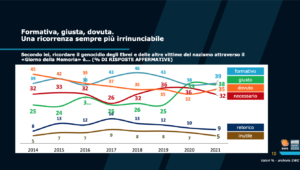“Memory protects our democracy”
 The number of Italians who consider the Holocaust Remembrance Day an essential democratic defense and a barrier against the advance of hate speech is increasing. It is the conclusion of the new survey conducted by the SWG Institute in collaboration with the editorial staff of Pagine Ebraiche.
The number of Italians who consider the Holocaust Remembrance Day an essential democratic defense and a barrier against the advance of hate speech is increasing. It is the conclusion of the new survey conducted by the SWG Institute in collaboration with the editorial staff of Pagine Ebraiche.
The research was presented last week in a video-conference by the director of SWG Riccardo Grassi in an event that, along with the editorial staff, saw the participation of the national coordinator against anti-Semitism Milena Santerini, the director of UNAR Triantafillos Loukarelis and the sociologist Betti Guetta of the Anti-Semitism Observatory of the CDEC Foundation. The UCEI president Noemi Di Segni held the conclusions.
The data collected are of considerable interest. The numbers catalogued and analyzed by SWG attest to the good health of the Holocaust Remembrance Day, which reaches the highest levels of public consideration since 2014 (the first year of the survey). It is a result that must not be taken for granted.
If in 2019 the media attention on the topic had been high and many events produced a spurt of collective indignation, in 2020, as SWG recalls, almost the attention was absorbed by Covid-19, relegating issues such as those of anti-Semitism quite on the sidelines.
That despite this, the attention threshold has not been lowered could therefore be an indicator, according to Grassi, “of a profound cultural change in the country”. Rather than an emotional spurt, it indicates a real awareness of the many threats to social stability encouraged by the crisis related to the pandemic. A number among others stands out. If in 2015, 39% of Italians were very or fairly worried about anti-semitism, today 55 out of 100 say so (in 2020 they were 52). A fact that is certainly not accidental.
The research offers many cues about future initiatives, also on a strategic-educational level. “In 2020 – says Grassi – we underlined that the percentage of those who considered it above all ‘fair’ to commemorate this anniversary had risen sharply. It was the sign of a semantic deviation from the past and a new update of the Holocaust Remembrance Day’s contents. The 2021 data confirm that interpretative framework, showing a drastic downsizing of the already small percentage of interviewees who defined the commemoration as rhetorical or useless and a strengthening of its most positive attributions: formative, just, due”.
The survey, carried out in recent weeks, also confirms the perception that the Holocaust Remembrance Day is a universal value reference. An event “that concerns all Italians and not just the descendants of the victims of the Holocaust”.
